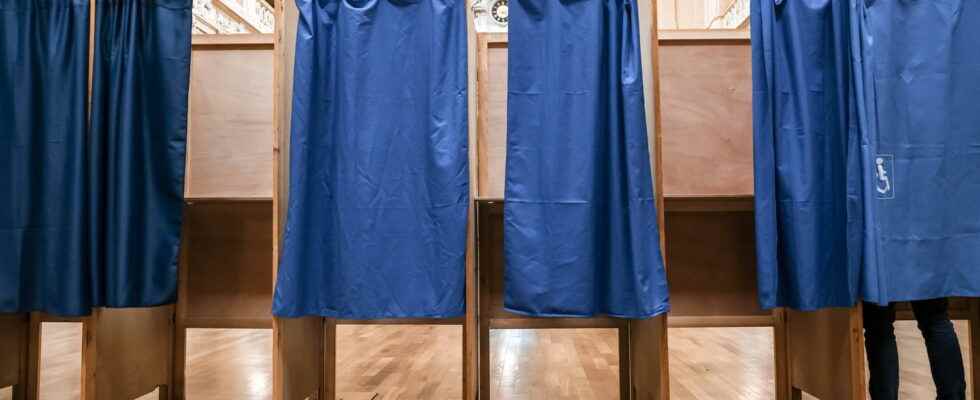ABSTENTION. Abstention in the second round of the 2022 presidential election is estimated at around 30%. How are the figures refined and how can they be analyzed in comparison with previous elections?
Presidential results near you
[Mis à jour le 24 avril 2022 à 23h17] According to an Ipsos-Sopra Steria estimate for France Télévisions this Sunday evening, the rate ofabstention in the 2nd round of the 2022 presidential election stands at 28.2%. Nearly 3 out of 10 voters therefore did not vote. This represents an increase of 2.8 points compared to 2017 at the same stage (25.4%). In the 2012 presidential election, abstention at the end of the second round was 19.6%; 16% in 2007 and 20.3% in 2022. In the first round of the 2022 presidential election, 26.3% of registered voters abstained, compared to 22.2% at the same time of the presidential 2017.
The calculation of the absentee rate, how does it work? The services of the Ministry of the Interior, which are in charge of the organization and the proper conduct of the ballot, give updated rates of participation and abstention at 5 p.m. and then at 8 p.m. Later in the night, the level of abstention is consolidated with final figures, once all the data from the polling stations has been tallied.
What abstention at 5 p.m. in the 2nd round?
The Interior Ministry’s estimates for the abstention rate in the second round of the 2022 presidential election at 5 p.m. were as follows: 36.77%. A figure up by almost two points compared to the abstention rate at 5 p.m. during the first round of the 2022 presidential election: 35%. As for the abstention rate of the 2nd round of the presidential election at 5 p.m., during the 2017 election, it stood for its part very precisely at 34.7%. Two weeks ago, during the first round, the abstention rate was also, as a reminder, a total of 26.31%. A figure which was still four points higher than that of 2017. But a rate still remaining low: more than one in four voters did not vote in the first round of the 2022 presidential election. an Ipsos-Sopra Steria estimate carried out for France Télévisions, abstention in the second round is estimated at 27.8%, i.e. 2.4 points more than in the second round of the presidential election in 2017 (25.4%) .
What abstention at noon for this second round?
Here is the first official figure for this 2nd round of the 2022 presidential election: the abstention rate is 73.59% at 12 p.m., according to the statement made and communicated at the beginning of the afternoon by the services of the ministry. inside. This is a high figure, which is intended to decrease significantly over the course of the day, since the ballot does not close until 8 p.m. this Sunday in the largest municipalities in France. Remember that at the same time, during the 1st round just two weeks ago, the abstention rate was 74.52% in France. Another figure to keep in mind: the abstention rate in the second round of the presidential election at noon, 5 years ago, amounted to 71.77% exactly.
Why is abstention so high?
Historically, since 1974, abstention in the 2nd round has been lower than in the 1st round of a presidential election, but 5 years ago, this was not the case. The qualification of Marine Le Pen, candidate of the far right, facing Emmanuel Macron, had not caused a significant mobilization. It seems that even today, the French are not going to the polls en masse to block the far right, as they did in 2002, when participation jumped 8 points between the two rounds of the presidential.
The polling institute Ipsos published a major analysis of the ballot on April 10, calling it “understanding the vote of the French”. Y is discussed at length the question of the decrease in the rate of participation in the ballot, the abstainers evoking a “beam of reasons” which all seem to be valid. For 28%, especially the oldest, “candidates say the same things as in previous elections, there is nothing new in their proposals”. About one in four regret that “the candidates are not up to the task” (26%), that “the bets are already made, there is no suspense over the result” (26%), or “that no candidate corresponds to their ideas” (24%).
One in five still think that “candidates do not talk enough about the subjects that concern them”, 18% “that the candidate they are closest to has no chance of qualifying for the second round”, 16% are still of the opinion that “this election will have no impact on their life or the situation of the country”, 16% also declare “not to be interested in politics in general” and 12% “were not available on the day of the vote”. “It’s not such a bad figure given the fact that many voters believe that the campaign was not good, that it had a relatively limited place in the public space”, relativizes Vincent Tiberj, researcher in electoral sociology, in an interview granted to 20 minutes on April 11. In addition, the particularity of the 2022 presidential campaign (often described as lackluster or unusual in the media) was the absence of debates and direct confrontation between the candidates. “Normally, political debates flow into society”, explained, still for 20 minutes, Thomas Vitiello, associate researcher at the Center for Political Research at Sciences-po. He added: “this time, the information circulated less, the population was less aware of the programs, the issues”.
